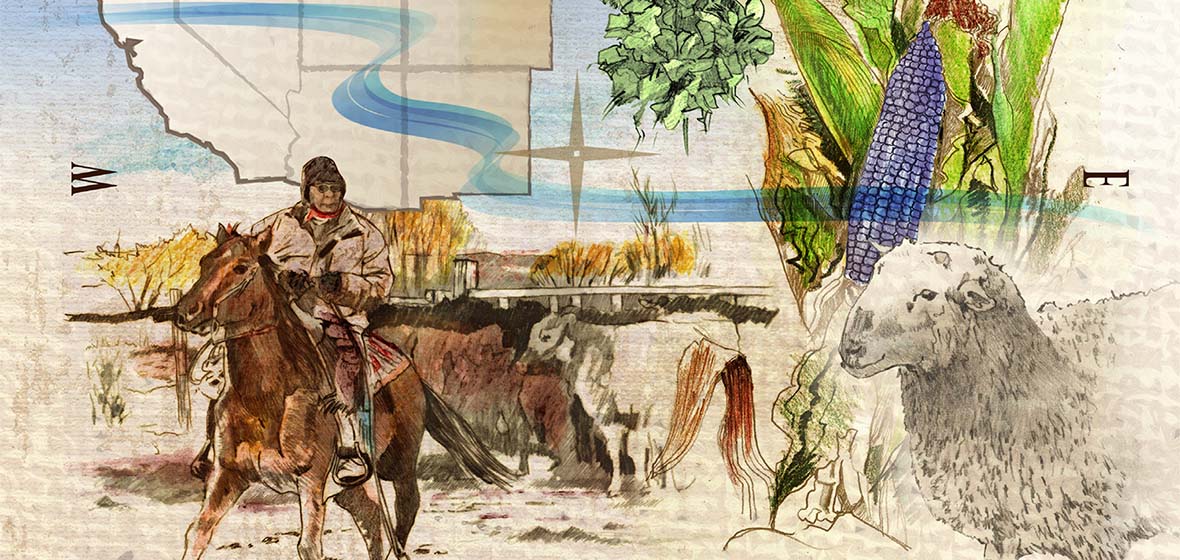Despite an above average snowpack and several months of wet weather, drought and changing climate conditions continue to plague farmers and ranchers across Nevada and other western states.
For American Indian communities in northern Nevada, the consequences of a changing climate and ecosystem are severe and will impact generations to come, according to research and outreach presented at the American Association for the Advancement of Science (AAAS) Annual Meeting in Washington, D.C.
A symposium titled "Climate, Water, and the American Indian Farmer" explored the impacts of climate change, Indian land tenure and water rights, and changes in land use on American Indian communities dependent on farming, ranching and sustaining cultural and natural resources. Led by Maureen McCarthy, Tahoe and Great Basin research director at the University of Nevada, Reno, the symposium was selected for a special presentation to science writers and reporters attending the national meeting.
"American Indian tribes currently possess some of the most senior water rights available," McCarthy explained. "Yet extreme, ongoing droughts in our region combined with changes in winter precipitation timing and form are complicating the allocation and use of water in the West and stimulating tribes, states and the federal government to negotiate equitable and sustainable water right settlements to ensure traditional and production agricultural practices are available to future generations.
"These issues are complex and transcend ecological and sociopolitical boundaries. Knowledge generated and shared through this program will build capacity among tribal and non-tribal organizations to respond to a changing climate."
The symposium highlighted work underway and premiered an AAAS-produced video on two significant research and public outreach projects, Water for the Seasons and Native Waters for Arid Lands, led by the University of Nevada, Reno and the Desert Research Institute, in partnership with the U.S. Geological Survey and other institutions.
Water for the Seasons is focusing on the Truckee-Carson River System as a model for snow-fed arid-land river systems across the American West. Researchers are integrating science and water policy research with extensive community outreach to identify the expected impacts of climate change and solutions for protecting valuable water resources throughout northern Nevada. Water for the Seasons is sponsored by the National Science Foundation and the U.S. Department of Agriculture.
Native Waters for Arid Lands is working directly with tribal members to identify challenges to agriculture from diverse and competing demands for water. Researchers and Extension experts, in partnership with Native American scholars and community leaders from more than a dozen tribes in the American Southwest, are integrating science and traditional knowledge to analyze how changing temperatures and reduced water supplies impact crop and livestock production and the abundance of fish and wildlife. The five-year program brings together faculty and students from the University of Nevada, Reno; Desert Research Institute; University of Arizona and Utah State University, and also involves the First Americans (1994) Land-Grant Consortium (FALCON), U.S. Geological Survey and Ohio University. Native Waters for Arid Lands is sponsored by the U.S. Department of Agriculture and the National Institute of Food and Agriculture.
The projects consider and build upon the University's decades of experience in building relationships with tribal communities in the Great Basin. For instance, the University of Nevada Cooperative Extension's Loretta Singletary, professor and interdisciplinary outreach liaison, and Staci Emm, associate professor and Extension educator, have facilitated considerable outreach to tribal communities and undertook an award-winning research and analysis of tribal agricultural practices. Singletary and Emm are now guiding much of the tribal-community outreach for the Water for the Seasons and Native Waters on Arid Lands projects.
"They are driving the train," Singletary said in a 2015 interview of the tribes' involvement. "This work will provide them with the information they need."












